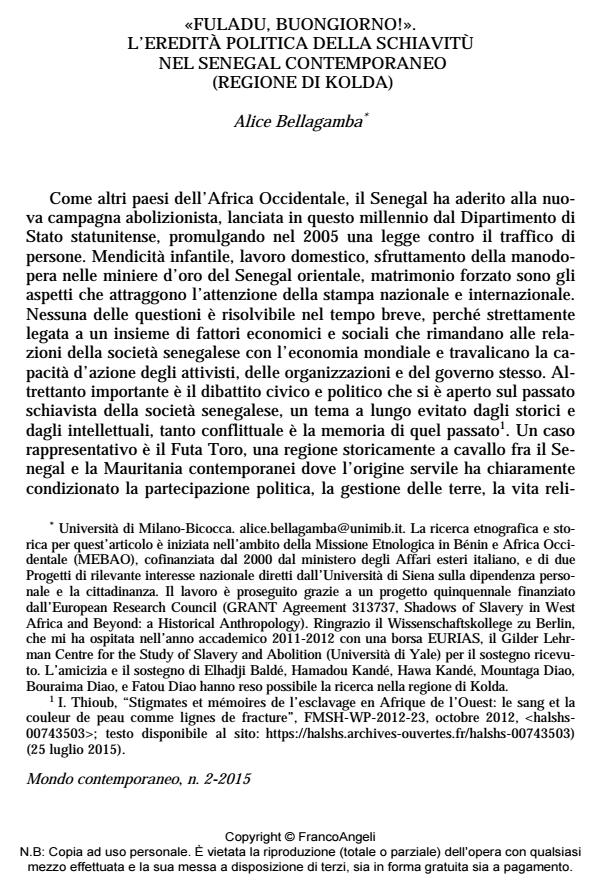«Good Morning Fuladu!». The Political Legacy of Slavery in Contemporary Senegal (Region of Kolda)
Journal title MONDO CONTEMPORANEO
Author/s
Publishing Year 2015 Issue 2015/2
Language Italian Pages 22 P. 43-64 File size 99 KB
DOI 10.3280/MON2015-002003
DOI is like a bar code for intellectual property: to have more infomation
click here
Below, you can see the article first page
If you want to buy this article in PDF format, you can do it, following the instructions to buy download credits

FrancoAngeli is member of Publishers International Linking Association, Inc (PILA), a not-for-profit association which run the CrossRef service enabling links to and from online scholarly content.
The historical research on Mauritania, Mali, Niger, Benin, Sudan and Somalia has shown the relevance of the legacy of slavery in the conflicts for political participation and for the control of land and resources. Mostly focused on the recent dynamics heralded by processes of decentralization in French West Africa, and by the civil war in Sudan and Somalia, this debate overlooks another important phase of African and world history: decolonization. Politicians, intellectuals and militants of the late 1940s and 1950s used the image of slavery to denounce the brutality of forced labor and to claim the emancipation from the colonial yoke. What was the impact of these metaphorical discourses on freed slaves and the people of slave ancestry? This article discusses the politicization of the legacy of slavery in the days of African search for independence by drawing on the history of Fuladu, a precolonial Fulbe kingdom that stretched from the southern banks of the Gambia River to Rio Corubal in Guinea Bissau. Colonization parted Fuladu between the British, the French and the Portuguese. Here, the analysis focuses on the French portion of this former kingdom, today known as the Senegalese region of Kolda, and on the trajectory of Yoro Kandé. A militant and a politician of the late 1950s, Yoro used his servile origins as a tool to raise the political awareness of the subordinate sections of the Fuladu society.
Keywords: Senegal, abolition, marginality, politics, life-trajectories
, «Fuladu, buongiorno!». L’eredità politica della schiavitù nel Senegal contemporaneo (regione di Kolda) in "MONDO CONTEMPORANEO" 2/2015, pp 43-64, DOI: 10.3280/MON2015-002003